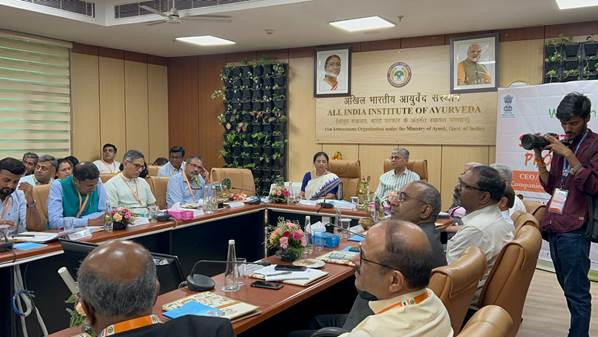Ministry of Ayush Organises Sensitisation Event for Insurance Companies and Ayush Hospital Owners
With the objective to make Ayush treatments available to the last mile patient, stakeholders gathered to discuss the regulatory framework and policy support needed to mainstream Ayush treatments in health insurance schemes at the sensitization program organised by the Ministry of Ayush for Insurance Companies and Ayush Hospital Owners at the All India Institute of Ayurveda (AIIA).
The meeting was necessitated due to the recent Insurance Regulatory Development Authority (IRDAI) directions to bring Ayush treatments under health insurance cover effective April 01, 2024 and the need to create a deeper understanding between Ayush Hospitals & healthcare providers and the insurance sector stakeholders and foster affordable Ayush healthcare to citizens.
Addressing the gathering, Secretary, Ministry of Ayush Vaidya Rajesh Kotecha, said, “The aim is to ensure easy access to Ayush treatments for everyone. A significant milestone was achieved with the joint publication of standard treatment guidelines by DGHS & Ayush (STG), marking a first-of-its-kind integration in India. The aim is to ensure easy access to Ayush treatments for everyone. This focus on accessibility is coupled with remarkable growth in the sector, with the manufacturing of Ayush products increasing eightfold in the last decade.”
Director, All India Institute of Ayurveda (AIIA) Prof. Tanuja Nesari, said, “We’re making significant strides in integrating Ayush treatments into the mainstream healthcare system. Our collaboration with insurance companies focuses on enabling cashless access to Ayush services through the TPA network. Today’s meeting is a pivotal step in this journey, bringing us closer to realizing our vision of making Ayush treatments accessible and affordable for all”.
Speaking about the need for separate registry for Ayush hospitals, Chairman, Core Group of Experts for Insurance, Ministry of Ayush Prof. Bejon Kumar Misra said, “a key recommendation is to promote Ayush HCO empanelment and Adopt Ministry of Ayush approved Standard Treatment Guidelines (STGs), ICD-TM2 codes and increase Ayush representation on key committees.”
MD & CEO, Apollo AyurVAID Hospitals Shri Rajiv Vasudevan, while speaking about the penetration of Ayush in Insurance Sector from the Ayush Hospitals’ Perspective said “The current insurance services are largely focused on surgical and emergency services but two-third of the sector belongs to people dealing with long-term diseases and effective Healthcare is required. The question is what do patients with long-standing issues, recurring issues autoimmune diseases, neurodegenerative diseases do? It’s time to go from symptomatic relief to identifying and working on the root cause of the disease(s). Ayush treatments will also be highly effective in case of palliative care and end-of-life care”.
We expect General Insurance Council to provide the leadership on behalf of its 39 general insurance, standalone health insurance, reinsurance and specialized insurance companies to be an integral component in publishing the White Paper,” further continued Mr Mishra.
The program that saw many stakeholders give their perspectives from both the insurance sector and Ayush Hospitals covering a range of issues including Insurance coverage in Ayush Sector, Standard Treatment Guidelines and penetration of Ayush in Insurance Sector and onboarding of Ayush hospitals on ROHINI platform and empanelment for insurance coverage.
Adviser, Ministry of Ayush said “Ministry of Ayush Dr. Kousthubha Upadhyaya, has constituted a Core Group of experts for Insurance Sector in October 2023 with the objective to advice and monitor insurance related matters in Ayush Sector and conduct a study of current status of Ayush systems under health insurance and to create a white paper.”
Ministry of Ayush and NHA are working towards inclusion of Ayush interventions in Ayushman Bharat-Pradhan Mantri Jan Aarogya Yojana (AB-PMJAY), he said.
Deputy Director General (Ayush) Ayush vertical in Director General of Health Services Dr. A. Raghu said, “A flat rate design is required since Ayush treatments require longer stays and should be classified on the basis of Rog Bal (disease strength) and the Rogi Bal (patients’ strength).” He also emphasized 3 levels of medical management (Mild/Moderate/Severe) for each disease where treatment duration should be systematically derived by experts.

